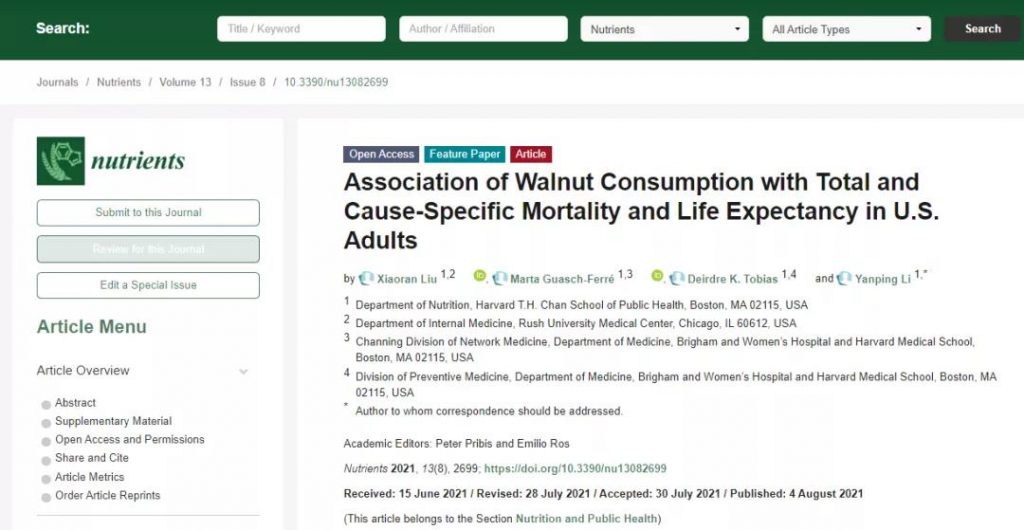
The nut known as the “longevity fruit” is _____? There is no doubt that the answer is “walnuts.”
Walnuts are rich in protein, minerals and vitamins and are the best among nuts. Previous studies have found that eating walnuts in moderation can help reduce the risk of cardiovascular disease.
Recently, the Harvard University research team gave new evidence that walnuts are good for health:
Compared with people who have never eaten walnuts, eating more than 5 servings (28 grams per serving) of walnuts per week can reduce both the risk of all-cause death and the risk of death due to cardiovascular disease, and increase life expectancy by 1.3 years.

Harvard University:
140 grams of walnuts per week helps prolong life
In this study, the researchers analyzed data from 93,340 adults, including 67,014 women in the American Nurses Health Study (NHS) cohort, and 26,326 men in the Health Professional Follow-up Study (HPFS) cohort.

Participants were free of cancer, heart disease, or stroke when participating in the study, and were followed for approximately 20 years. Researchers check their diet every 4 years, including overall dietary intake, frequency of eating walnuts and other nuts, as well as exercise and smoking status.
After adjusting for multivariate factors, the researchers found that walnut intake was negatively correlated with all-cause mortality and mortality due to cardiovascular disease.
Compared with people who do not eat walnuts, eating more than 5 servings of walnuts per week (a 28g serving, about two or three walnuts) may have the greatest benefit in reducing mortality and prolonging life. Specifically, it is related to the risk of all-cause death A 14% reduction is related to a 25% reduction in the risk of dying from cardiovascular disease, and life expectancy can be extended by about 1.3 years.
Eating 2 to 4 servings of walnuts per week can help reduce the risk of all-cause death by 13%, reduce the risk of death from cardiovascular disease by 4%, and increase life expectancy by approximately 1 year.
Researchers say that even eating only a few handfuls of walnuts per week may promote longevity, especially for people whose diet is not high in quality.
However, the researchers also emphasized that as an observational study, the conclusion still needs further research to confirm. Nonetheless, this finding strongly proves that eating walnuts can help prolong lifespan and healthier overall.
Nutritional advantages of a walnut
In addition to helping to prolong life, the health benefits of walnuts have been previously studied.

Protect the heart and reduce inflammation levels
A study published in the Journal of the American College of Cardiology (JACC) involving 634 participants found that walnuts help improve heart health and reduce the risk of inflammation.

Help prevent diabetes
Research from Harvard University in the United States shows that eating walnuts twice a week can reduce the risk of type 2 diabetes by 24%, and the data is especially positive for women.
Improve intestinal health
In 2020, a study published in the American Journal of Nutrition pointed out that walnuts can promote the growth of beneficial intestinal bacteria, improve intestinal health, and help reduce the risk of cardiovascular disease in the long term.

According to nutrition experts, walnuts have the following advantages in food composition:
Contains omega 3 fatty acids
Namely alpha linolenic acid, this fatty acid can be converted into DHA (docosahexaenoic acid) in the body.
The International Society for Fatty Acid and Lipid Research recommends that adults should consume 500 mg of omega 3 fatty acids per day.
Two walnuts a day can satisfy the human body’s need for omega 3 fatty acids.
What needs to be reminded is that eating walnuts is beneficial but not equivalent to “buying the brain.” Human intelligence reaches its peak around the age of 20 to 30, and it is difficult to improve afterwards.
Contains sphingomyelin
It is one of the structural substances that make up the nervous system and an indispensable raw material for the development of the nervous system.
Contains more phytochemicals
Walnuts are rich in antioxidants such as vitamin E and polyphenols, as well as minerals such as calcium, magnesium, and potassium, especially polyphenols.
The American Chemical Society is particularly optimistic about walnuts, believing that the antioxidant effect of walnuts is nearly twice that of other nuts, and you can eat 7 per day.
How to eat walnuts to benefit the most?
On the basis of a balanced diet, eating a small amount of walnuts every day is a simple, low-cost self-health care measure.

Number: 2~3 per day
The protein content in the walnut kernel is 12%-20%, the fat is about 60%-70%, and the dietary fiber is about 5%.
Eat 10 grams of nut kernels as a snack every day, and there are about 10 grams of nut kernels of two or three walnuts.
It’s okay to eat up to 25 to 28 grams, but you need to reduce your intake of other foods, such as using walnuts to replace snacks such as biscuits and beef jerky, or using less oily steamed vegetables to replace fried dishes during cooking.
Variety: Original
When eating walnuts, the original flavor is preferred, without salt or sugar, and it is best to eat with the brown skin on the outer layer of the walnut kernel.
Method: eat now
When the walnut is opened, the walnut kernel will be broken, which will increase the chance of contact with oxygen, thereby promoting oxidative deterioration.
In oxidized walnut kernels, vitamin E is destroyed, polyphenols and other antioxidant substances are lost, and omega 3 fatty acids among them may also be destroyed.
Health is inseparable from a balanced diet. If you overeating frequently, no amount of walnuts will help. On the basis of a healthy diet, taking walnuts as a healthy snack supplement is really good for your health.
Comments